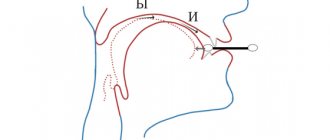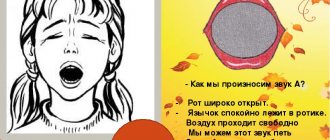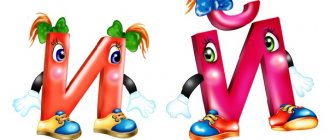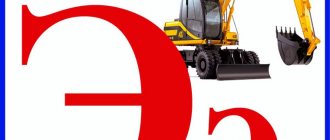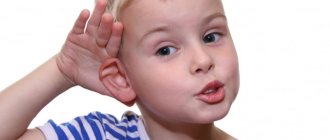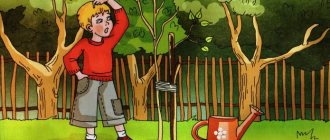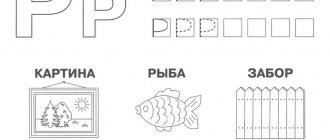Goals and objectives
The main goal of the classes is for the child to master the rules for writing the letter E and the principles of using it in words of different parts of speech, as well as the development of recognition skills for this symbol.
Teaching a child to distinguish the letter E from others, to write it beautifully and legibly, to consciously use it in words, and to pronounce this sound correctly are the main tasks. It is advisable to arouse interest in learning letters with the help of fairy tales, poems, riddles and exciting games for preschoolers.
Learning the alphabet with young children is difficult, but if you conduct lessons on the topic “Letter E” correctly, then problems will no longer arise throughout the entire training.
Using ICT in Literacy Classes
lesson notes for the senior group. The lesson involves the use of ICT
View the contents of the document Using ICT in Literacy Classes
Municipal preschool educational budgetary institution "General developmental kindergarten No. 14 "Solnyshko" Arsenyevsky district
Direct educational activities in teaching literacy (speech development) using ICT
On the topic: “Journey to the Planet of Sounds” for children of senior group No. 10 “Sun”.
Educator: Vasilyeva Oksana Sergeevna,
highest qualification category
Target
: generalization and consolidation of the material covered.
Integration of educational areas:
“Cognitive development”, “Socio-communicative development”, “Artistic and aesthetic development”, “Speech development”, “Physical development”.
consolidate children's knowledge of vowels and consonants;
teach children to conduct a sound analysis of a word, differentiating sounds according to their qualitative characteristics (vowels, consonants);
improve phonemic awareness: learn to identify sounds in a word, determine its place in a word;
develop the ability to divide words into syllables;
develop and strengthen small arm muscles;
develop independence and initiative.
develop the ability to listen carefully and follow the instructions of the teacher;
continue to develop the ability to defend your point of view;
build a sense of camaraderie.
Techniques:
1. Leading questions. 2. Collective conversation. 3. Speak up and be heard. 4. Silent polling. 5. Game techniques (spaceship, hats with sounds). 6. Division into subgroups and work in subgroups. 7. Changing the volume and tempo of the voice.
8. Use of visualization using a multimedia installation and handouts.
Multimedia system with presentations on the topic: “Journey to the Planet of Sounds”, “Fascinating Space”.
Object pictures, toys, products, the name of which contains the sound “__k___”; magnetic board..
Handouts: clothespins (blue and red), “Cat” cards with a picture and diagram, chips for sound analysis
Educator
: Guys, please come to me. Tell me what's your mood today?
Children:
good, joyful, cheerful.
Educator:
Fine. Let's hold hands and convey our good mood to each other. (Stand in a circle)
All the children gathered around.
I am your friend and you are my friend.
Let's hold hands tighter
And let's smile at each other.
(Slide1,2) Educator
: Guys, today we received an email from the Fairy of the Planet of Sounds. She asks you for help.
Dear Guys! A big problem has happened on my planet. My friends - sounds quarreled and don't talk to each other. Help me reconcile them. Come quickly, I can’t cope without you. The path to the planet of sounds is long and very difficult, but I think that you will not be afraid of difficulties and will overcome all obstacles along the way. I will wait for you.
Educator
: Shall we help her? (children's answers)
What can we use to help? (children's answers: on an airplane, rocket, etc.)
Educator
: We are getting ready to fly. We are building a new starship
(They are building a spaceship). Educator
: Guys, let's take some gifts with us for the inhabitants of the planet of sounds.:
Dee "Shop"
(Vol. informs that now everyone will go to the store for shopping. You can only buy those goods whose names contain the sound K. Upon returning from store, the child names what he bought, the others check it). Children put all their purchases in baskets in the cargo compartment of the ship.
Educator
: Guys, the spaceship is locked. Let's open it
There's a lock on the door,
Who could open it?
They knocked, twisted, pulled...
Educator:
To board the ship, you need to pronounce your name so that it is clear how many syllables (parts) there are in your name.
What can help us correctly determine how many parts (syllables) there are in a word? (clap, walk, etc.) The game “Divide the words into syllables”
Children say their names and divide it into parts. Then they board the rocket,
(Slide 3 “Rocket Flight”) Educator:
Has everyone taken their seats? Our rocket begins to take off
Educator:
Let's remember
– What are sounds? (we hear and pronounce sounds).
– What sounds do you know? (vowels and consonants).
– Why were the vowel sounds called that? (they sing, fly, nothing interferes with them, there is no obstacle in your mouth when you pronounce them)
– Why were consonant sounds called that? (they do not sing, cannot fly, they are prevented by an obstacle: tongue, lips, teeth)
– What types of consonants are there? (hard and soft).
The hard ones are the older brothers, and the soft ones are the younger brothers.
Educator
: And now I suggest you play
the game “Name Your Brother.”
You stand in a circle. I will throw you a ball and call you “big brother” - a hard sound, and when you catch the ball, you call “little brother” - a soft consonant sound and return the ball back. The teacher names the sounds (b, c, d, d, w, z, m, l, p, s, k, r, z, n) Children name little brothers.
(Slide 4)
Meeting astronaut kittens
Educator: Guys, look at the astronaut kittens appearing in the window of our ship. Let's play with them.
D/game “One - many”
(one...cat, two...cats, many...cats)
– What is the affectionate name for a cat?
(one...cat, two...cats, many...cats)
Let's conduct a sound analysis of the word CAT .
Making a word model using clothespins and chips
The music is “Mesmerizing space, slide 6, space slides)
Gymnastics for the eyes.
We close our eyes, these are the miracles. (Close both eyes)
Our eyes are resting and doing exercises. (We continue to sit with our eyes closed)
And now we will open them and build a bridge across the river. (Open your eyes, draw a bridge with your gaze)
Let's lift it up and look down. (We raise our eyes up, we lower them down)
Let's turn right, left. (Eyes look left and right)
And we will begin the flight again.
(Slide 7) Riddle about an alien
I know: I'm from another planet. It’s so strange for me to look around: The earthlings are dressed so funny, They have so few eyes and hands!
(Slide 8). We meet an alien
Educator:
Guys, our alien friend is studying our language and asks you to help him complete some tasks, he cannot cope with them.
(Slide 9) No. 1. We all know that words can be long and short, let's put the animals in their houses
(Slide 10,11) No. 2: “Choose the extra word”
(Slide 12,13) No. 3 “Name the common sound in words”
(Slide 14) No. 4 “Which pets have names that begin with the sound k”
(Slide 15, warm-up video):
Educator:
guys, we completed all the tasks, helped our dug and he wants to thank us and gives you
a Cosmic warm-up Educator:
Finally, we have arrived on the planet of sounds
In order for the door of our ship to open and we go down to the planet, we need to complete the task again: Game “Catch the Sound”
Guys, in this task you must catch the sound, i.e. When you hear the sound “r”, clap your hands.
– in the sound series: a, u, l, r, i, i, e;
– in the syllabic series: ra, ti, ur, ko, ri, uh, ro;
– in words: tiger, duck, lynx, toy, whale, book, rocket, boat, steering wheel.
(Slide 16) Educator:
Well done, guys, you completed all the tasks, let's get out of the ship.
A fairy and sad sounds appear on the slide.
He says hello and asks. How can we reconcile sounds?
(Slide 17)
Mirilochka for sounds: children learn Mirilochka with sounds.
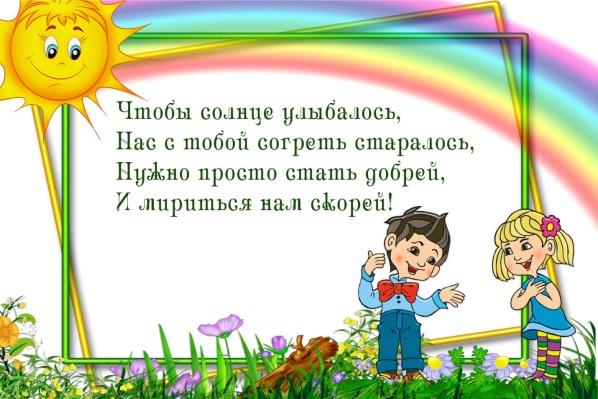
After the children say the little word, the sounds are reconciled (image of funny sounds).
(Slide 18)
Educator: Guys, the sounds want to play with you.
Dee "Finish the word"
Goal: To develop children’s ability to divide words into syllables.
Progress: Children stand in a circle. Teacher with a ball in.
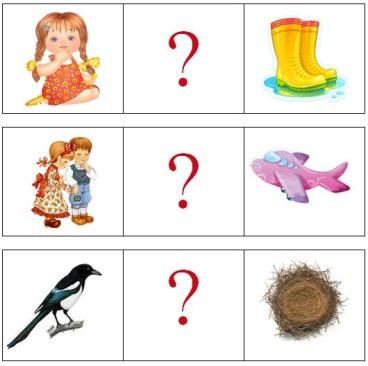
(Slide 20). Educator
: Guys, it’s time for us to go, we have reconciled the sounds, now there will be no more sadness on the planet of sounds. (Say goodbye to the fairy and sounds)
Children board a spaceship.
(Slide 21). Educator:
Here is another riddle from the Fairy:
(Gives out stars from the Fairy)
Slide 22. (star space)
Slide 23. Educator: guys, while our spaceship is flying towards our planet, let's relax and admire the starry sky. Video “Electronic gymnastics for the eyes)
Slide 24.
(approaching planet Earth).
– Guys, did you like our space travel?
- What was interesting?
– Which tasks were easy for you?
– Which ones did you find difficult?
– If you liked the activity, attach a red clothespin to the rocket.
Task for preschoolers: printed letter E
It is difficult for young children to perceive information only by ear, so it is better to do exercises that also involve eye contact with objects.
Exercise 1
Write E and E in three different colors, for example red, blue, green.
Task 2
Give examples of 3 animals whose names begin with E. Suitable words: raccoon, echidna, unicorn.
Task 3
Name three words starting with E. For example, Christmas tree, ruff, hedgehog.
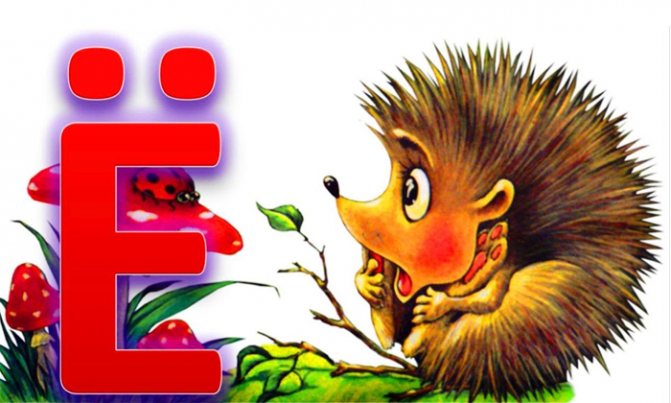
In one of the tasks, the child must say a word starting with Yo, for example Hedgehog.
Task 4
Circle all the E and E in the presented row: A c g v E l e v Sh f m i E y c e f X S F sh k e e k.
Task 5
Name three names that have E in them.
Task 6
Make up five words that contain E.
Task 7
Determine the place of the given sound in the listed words: eve, spruce, bear, hay, foam, hedgehog.
